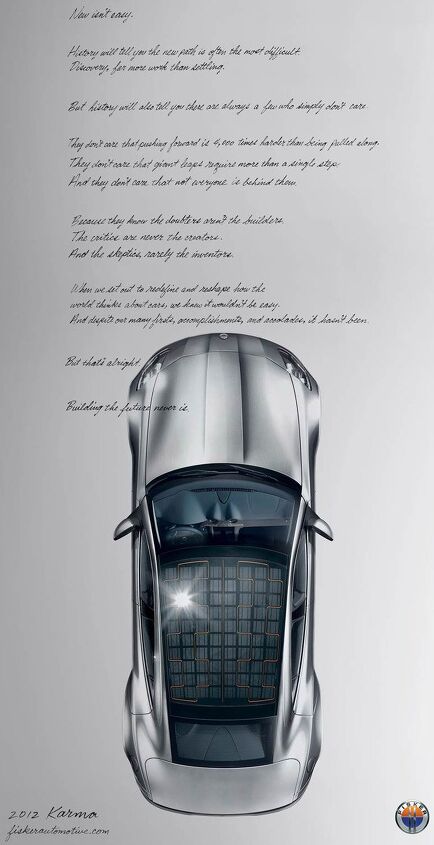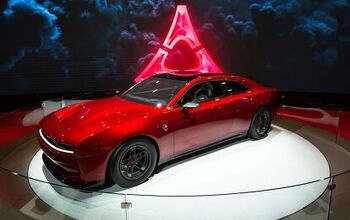Fisker Reboots Marketing With Old Media Ad Buy

In what Fisker insists is not a defensive reaction to a cascade of bad news that has put the company’s continued survival in doubt in at least a few observers’ minds, Fisker’s ad agencies, eMaxx Partners and Mono, have run a series of ads strung out over five pages of Friday’s Wall Street Journal print edition.
The ad buy consisted of four quarter-page ads followed by a full page devoted to Fisker. A representative of eMaxx called the ads a “sneak peek of the brand voice” that will be further exposed in a larger worldwide marketing campaign to be launched in the third quarter of 2012. Though the campaign was kicked off with an ad buy at one of the oldest of old media outlets, the larger campaign will include a variety of media outlets by not much in the way of television ads. The main thrust of the campaign seems to be painting Fisker as a visionary company akin to the inventors of the 19th and 20th centuries that brought us the modern world.
In the press email announcing the WSJ ads, Henrik Fisker said, “Launching a new car company is a difficult enough challenge on its own and one that is rarely attempted, let alone also trying to establish a new brand with a revolutionary new product and technology.” Roger Ormisher, director of global PR for Fisker, said, “The ads are about celebrating the achievement of bringing a new car company to market during one of the worst economic downturns ever. There are always critics and skeptics of any new project, especially one that’s been in the political spotlight. But this is underlining what we achieved.”
The ad buy in the Journal might seem anachronistic for a technology based product but despite new media and the growing impact of social networks, but if you want to sell cars to the people who can afford a $100,000 second or third car (which because of the Karma’s limited range it necessarily would be – Justin Bieber has a Cadillac CTS-V wagon to drive when his chrome wrapped Fisker Karma is low on juice) there are worse places than the weekend editions of the Wall Street Journal. For decades the automotive classifieds in the Journal have been like a candy store for car enthusiasts, and they continue to be so as other newspapers get put out of business by the Scylla of eBay and Charybdis of Craigslist. The classified automotive section of the WSJ of course has the high buck Ferraris, Lamborghinis and Rolls-Royces that you’d expect but there usually are some interesting collectible enthusiasts cars for those on a slight more limited budget also listed by private parties or by exoticar dealers. Simply put, rich folks still read the print edition of the Wall Street Journal.
Fisker ad copy:
New isn’t easy.
History will tell you the new path is often the most difficult.
Discovery, far more work than settling.
But history will also tell you there are always a few who simply don’t care.
They don’t care that pushing forward is 4,000 times harder than being pulled along.
They don’t care that giant leaps require more than a single step.
And they don’t care that not everyone is behind them.
Because they know the doubters aren’t the builders.
The critics are never the creators.
And the skeptics, rarely the inventors.
When we set out to redefine and reshape how the
world thinks about cars, we knew it wouldn’t be easy.
And despite our many firsts, accomplishments, and accolades, it hasn’t been.
But that’s alright.
Building the future never is.

Ronnie Schreiber edits Cars In Depth, the original 3D car site.
More by Ronnie Schreiber
Latest Car Reviews
Read moreLatest Product Reviews
Read moreRecent Comments
- Theflyersfan The wheel and tire combo is tragic and the "M Stripe" has to go, but overall, this one is a keeper. Provided the mileage isn't 300,000 and the service records don't read like a horror novel, this could be one of the last (almost) unmodified E34s out there that isn't rotting in a barn. I can see this ad being taken down quickly due to someone taking the chance. Recently had some good finds here. Which means Monday, we'll see a 1999 Honda Civic with falling off body mods from Pep Boys, a rusted fart can, Honda Rot with bad paint, 400,000 miles, and a biohazard interior, all for the unrealistic price of $10,000.
- Theflyersfan Expect a press report about an expansion of VW's Mexican plant any day now. I'm all for worker's rights to get the best (and fair) wages and benefits possible, but didn't VW, and for that matter many of the Asian and European carmaker plants in the south, already have as good of, if not better wages already? This can drive a wedge in those plants and this might be a case of be careful what you wish for.
- Jkross22 When I think about products that I buy that are of the highest quality or are of great value, I have no idea if they are made as a whole or in parts by unionized employees. As a customer, that's really all I care about. When I think about services I receive from unionized and non-unionized employees, it varies from C- to F levels of service. Will unionizing make the cars better or worse?
- Namesakeone I think it's the age old conundrum: Every company (or industry) wants every other one to pay its workers well; well-paid workers make great customers. But nobody wants to pay their own workers well; that would eat into profits. So instead of what Henry Ford (the first) did over a century ago, we will have a lot of companies copying Nike in the 1980s: third-world employees (with a few highly-paid celebrity athlete endorsers) selling overpriced products to upper-middle-class Americans (with a few urban street youths willing to literally kill for that product), until there are no more upper-middle-class Americans left.
- ToolGuy I was challenged by Tim's incisive opinion, but thankfully Jeff's multiple vanilla truisms have set me straight. Or something. 😉


































Comments
Join the conversation
Lefties can never win on facts. Slurs and name calling is their stock in trade.
I would be in Fisker's camp except Tesla seems to be putting out better cars cheaper. Tesla is also not only doing its own engineering, but also doing custom engineering for other companies.